You know what's fascinating? Gambling goes way beyond those flashy Vegas casinos and online poker sites we're all familiar with today. Let's take a journey back in time and discover something pretty incredible about our ancestors – they were just as intrigued by games of chance as we are.
Think about this: Ancient Egyptian pharaohs weren't just rolling dice for fun. They actually believed these games could help them communicate with the gods. Pretty wild, right? And over in ancient China, emperors weren't heading to the casino – they were using tile games to solve serious political disputes. Meanwhile, Native American tribes developed intricate stick games that did way more than just entertain – they helped distribute resources throughout their communities.
But here's the thing – these weren't just games people played to win big or show off. They were deeply woven into the fabric of these societies. We're talking about spiritual ceremonies, ways to level the playing field between social classes, and even complex systems for different cultures to interact and exchange ideas.
When you really dig into gambling's history, it tells us so much more than who won or lost. It reveals something fascinating about human nature – how different civilizations tried to make sense of luck and destiny, and maybe even control it a little bit. Sure, we might play poker on our phones now, but that same human desire to test our luck? That hasn't changed one bit over thousands of years.
Ancient Egyptian Gaming Rituals
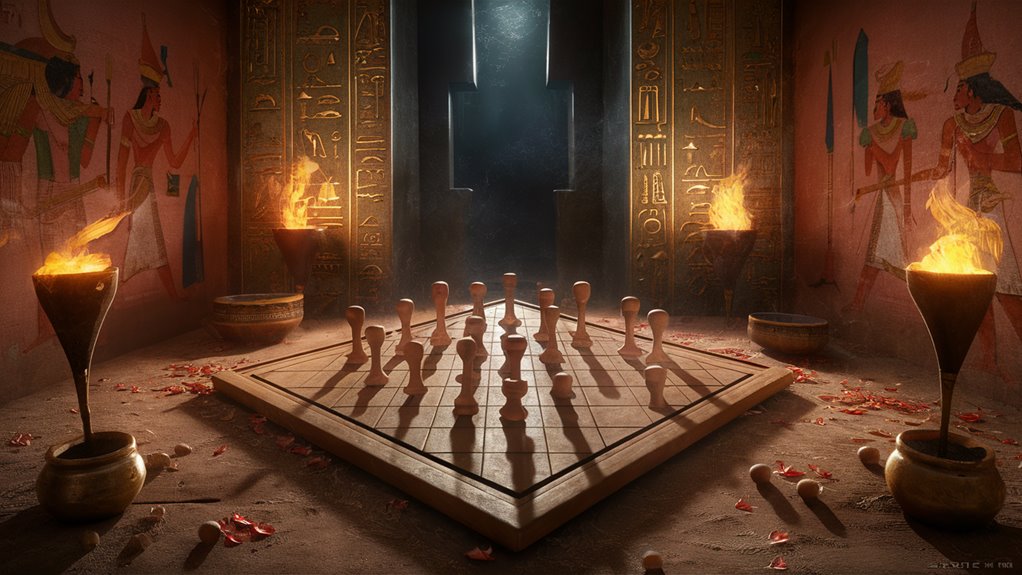
You know how we tend to think of ancient games as simple entertainment? Well, the Egyptians saw things quite differently.
For them, playing games was actually a deeply spiritual experience, connecting them directly to their gods. Pretty fascinating, right?
Take a look at their tomb paintings and you'll spot something interesting – gaming scenes right next to religious ceremonies. The ancient Egyptians believed these weren't just casual pastimes, but rather powerful tools to understand the gods' wishes and get a sneak peek into what awaited them in the afterlife.
The real star of Egyptian gaming was Senet, which goes way back to around 3500 BCE. Think of it as their version of chess, but with much higher stakes.
Players would move beautifully carved pieces based on throws of marked sticks or bones. But here's the thing – doing well at Senet wasn't just about bragging rights.
People believed your performance showed how much the gods, especially Thoth and Ra, favored you.
Then there was Mehen, a really unique game played on a board shaped like a coiled snake. You can tell it was a big deal because archaeologists keep finding these boards in fancy tombs of important people.
The snake design wasn't random either – it represented the sun god's nightly journey through the underworld.
It's kind of cool to think that these Egyptian gaming traditions eventually shaped how Romans and Greeks approached their own games of chance.
Chinese Gambling Through the Ages
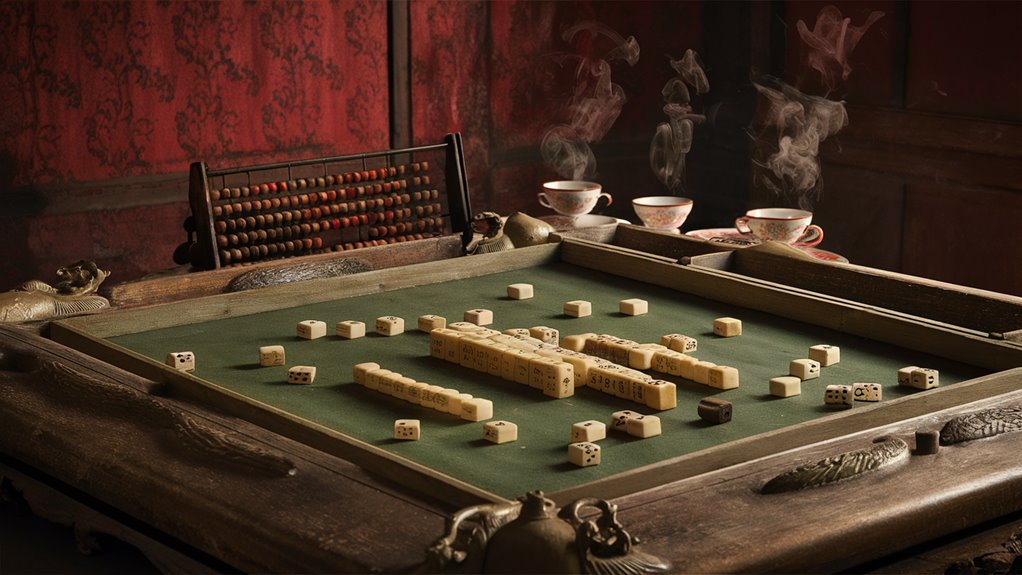
Let's dive into the fascinating world of Chinese gambling, a tradition that goes back an incredible 4,000 years.
You might be surprised to learn that people were placing bets as far back as the Xia Dynasty. Picture this: ancient Chinese players huddled around intricate board patterns, moving pieces in a game called liubo while wagering their prized possessions.
Ever wondered where playing cards came from? Well, the Han Dynasty gave us some of the earliest versions, and you can still see traces of these designs in the cards we use today.
Things got really interesting during the Tang Dynasty with a game called keno. Back then, they actually called it "white pigeon ticket" because, believe it or not, they used pigeons to fly between villages with the game results. Talk about an early version of instant messaging!
Speaking of popular games, mahjong showed up during the Qing Dynasty and has stuck around as one of China's most beloved gambling traditions.
The Ming Dynasty brought some structure to the scene, with government officials keeping a watchful eye on gambling houses and making sure they got their share through taxes.
You know how families today gather around during holidays for games and fun? That tradition actually started during the Ming Dynasty, when Chinese New Year became the perfect excuse for families to try their luck with games of chance.
And here's something cool – many of the casino games we enjoy today, like pai gow poker and sic bo, can trace their roots right back to these ancient Chinese traditions. Pretty amazing how these games have stood the test of time, right?
Native American Betting Traditions
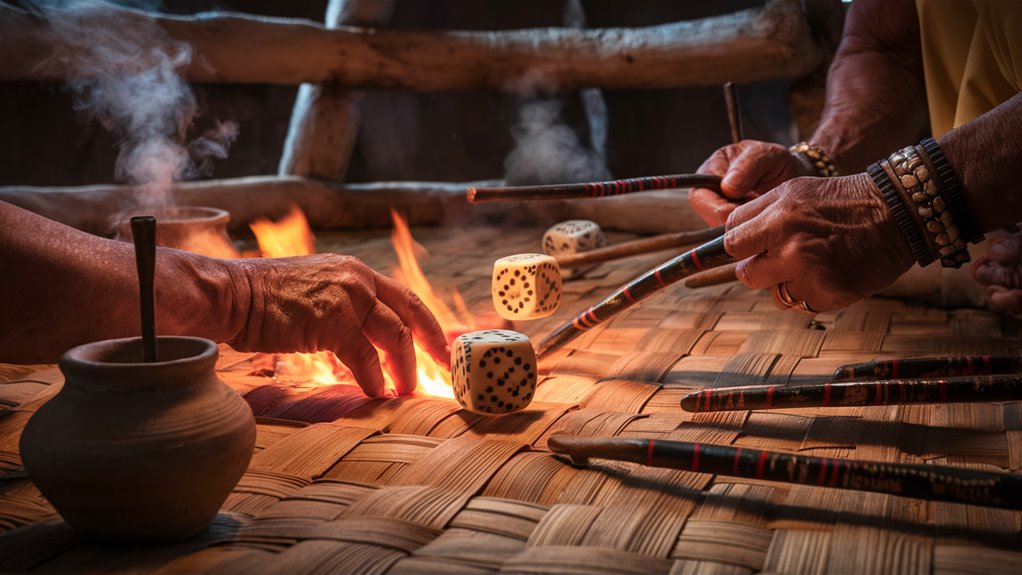
You know, when we look back at gambling traditions, Native American tribes had some fascinating customs that go way back, long before Europeans arrived on these shores.
Let's talk about how these tribes developed their own unique games and betting practices over thousands of years.
Think about walking into a traditional Native American gathering – you'd likely spot people huddled around games like stick dice, hand games, and bowl games.
Each tribe had their own special twist on these games, making them uniquely meaningful to their culture.
Take the Plains tribes, for instance. They didn't mess around when it came to betting – we're talking serious wagers like prized horses, weapons, and even clothing.
The Cherokee had this really interesting game called "Chunkey," where
Roman Games of Chance
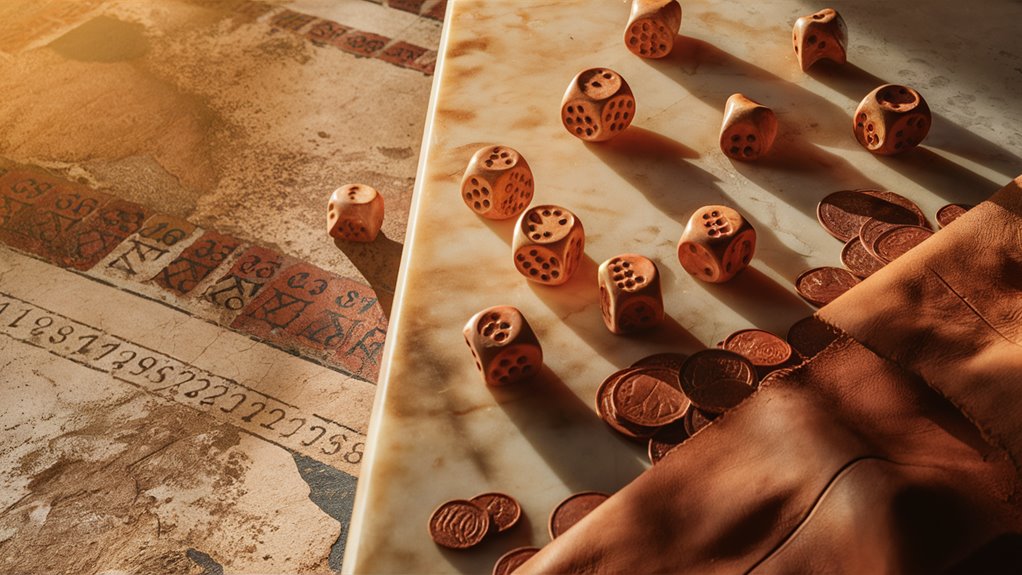
When you think about ancient Rome, you might picture gladiator battles or chariot races, but let's talk about something equally fascinating – their love for games of chance.
Picture yourself walking into a bustling Roman tavern, where people from all walks of life gathered around tables, shaking dice and placing bets.
Romans were crazy about dice games, and their favorites included "tali" and "tesserae." Think of tali as the ancestor of modern dice games, but instead of cube-shaped dice, they used four-sided knucklebones.
Tesserae might look more familiar to you since they used six-sided dice, pretty much like the ones we roll today.
Ever heard of backgammon? Well, Romans had their own version called "duodecim scripta." It wasn't just pure luck – you'd to think strategically while moving pieces across three rows of twelve marks based on your dice throws.
And if you wanted something simpler, there was always "par impar," a straightforward odd-or-even betting game that was so popular even emperors couldn't resist playing it.
Here's the funny thing about gambling in ancient Rome: it was technically illegal most of the year except during Saturnalia festivals, but nobody really seemed to care.
Kind of like how your uncle might run a friendly poker game in his basement, you know?
We know this from discoveries in Pompeii, where archaeologists found graffiti showing betting odds and gambling debts.
Some things never change – they even found loaded dice, proving that cheating at games is as old as the games themselves.
And get this: according to biblical accounts, Roman soldiers even gambled for Christ's garments, showing just how deeply ingrained these games were in their culture.
Medieval European Gambling Houses
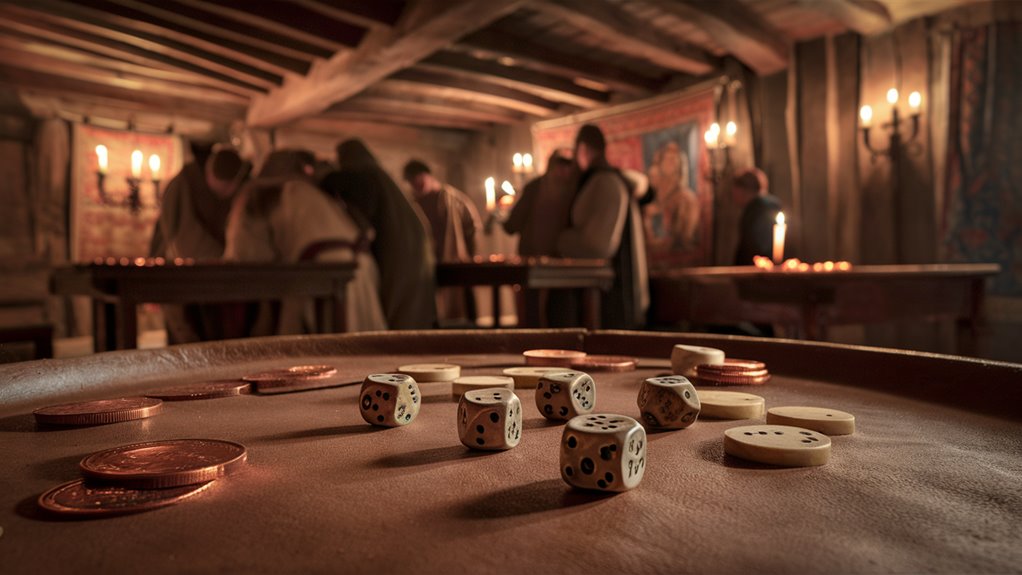
Ever wondered what gambling was like back in medieval Europe? Well, let me paint you a picture.
What started as simple games of chance in local taverns gradually evolved into full-fledged gambling houses, where everyone from nobles to ordinary folk would try their luck at various games.
Picture yourself walking into one of these lively establishments in a bustling medieval city. You might find yourself caught up in a game of "hazard," which, believe it or not, is actually the grandfather of modern-day craps.
Or maybe you'd be drawn to a table of "primero," where the earliest forms of poker were taking shape. And if you were feeling particularly adventurous, there was always the excitement of betting on animal fights.
Here's something fascinating about these places – they were like mini-societies with their own pecking order. Think of it as a medieval version of today's VIP rooms.
The wealthy nobles would hang out in fancy private rooms upstairs, placing high-stakes bets, while the common folk gathered in the livelier, noisier halls below. The house owners weren't taking any chances with cheaters, though. They'd sharp-eyed spotters keeping watch and strict rules to keep everyone honest.
And get this – they even had their own version of credit cards! Well, sort of. Money-lenders would lurk around, ready to offer quick loans to unlucky players who'd lost their last coin.
But watch out – those interest rates would make modern credit card companies blush. Some gambling houses operated in legal gray areas, while others paid their dues through licenses and taxes, depending on where you were in Europe.
Colonial Era Betting Culture
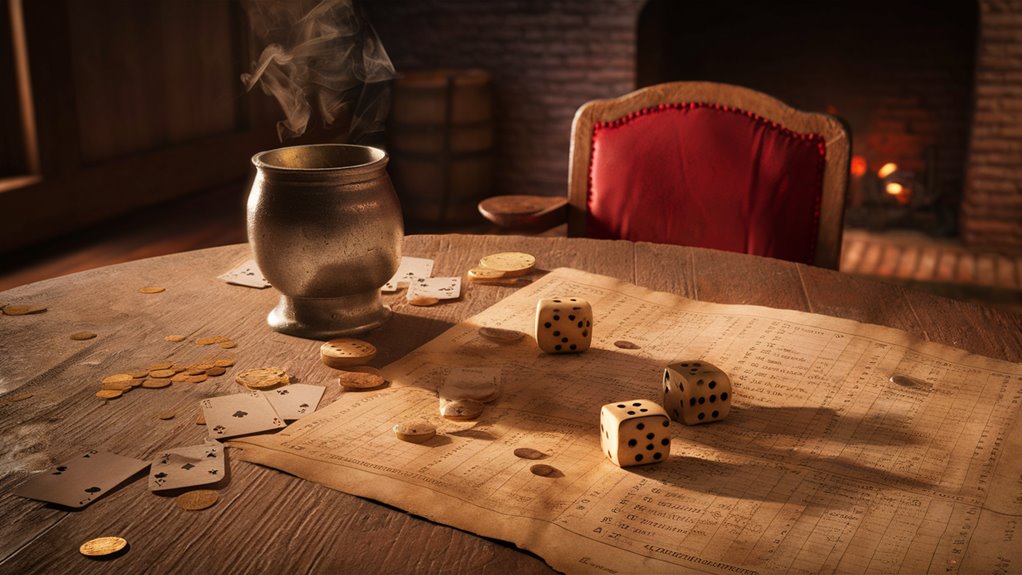
Let's talk about how gambling shaped early American life – it's quite a fascinating story.
When settlers first arrived in the New World, they brought along more than just their hopes and dreams. They packe
Rise of Modern Casinos
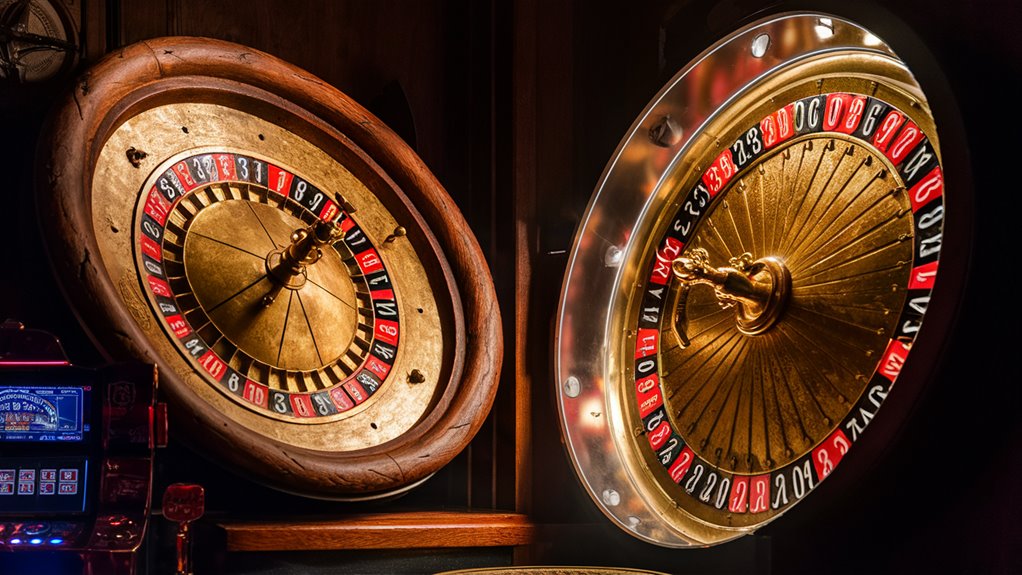
You know, it's pretty fascinating how modern casinos got their start in the Nevada desert back in 1931 when the state decided to make gambling legal.
Las Vegas wasn't always the glittering playground we know today – it actually started as just a small railroad stop. But things really took off when places like El Rancho Vegas and the Flamingo opened their doors, setting the stage for what would become the entertainment capital of the world.
The gambling scene got even more interesting in the 1970s when Atlantic City jumped into the game. Suddenly, folks on the East Coast didn't have to trek all the way to Nevada to try their luck at the tables.
Then came a real game-changer in 1988 – the Indian Gaming Regulatory Act. This opened the door for Native American tribes to run their own casinos on tribal lands. Pretty incredible when you think about it – now there are tribal casinos in 29 states, pulling in billions of dollars every year.
Looking at casinos today, well, they're almost unrecognizable from those early days.
Take a look at places like Singapore and Macau, where they've built these massive integrated resorts that give Las Vegas a run for its money. These aren't just places to gamble anymore – they're like small cities packed with fancy restaurants, spectacular shows, high-end shopping, and massive convention centers.
And let's not forget how technology is reshaping everything. The rise of online gambling platforms and betting apps means you don't even need to leave your couch to get in on the action. The casino world sure has come a long way from those dusty Nevada beginnings.
Digital Revolution in Gambling
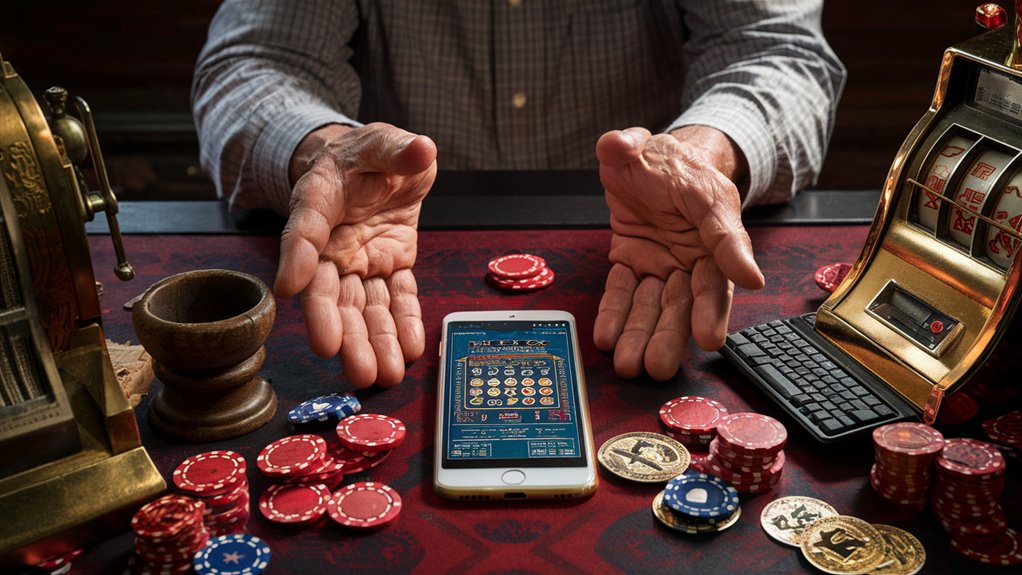
You know how technology has a way of changing everything? Well, that's exactly what happened to gambling in the late 1990s.
Think about it – suddenly you could play your favorite casino games right from your living room couch. Those early gambling websites were pretty basic, with simple slots and poker rooms that looked like something from an old video game.
Things really picked up steam by the mid-2000s. Picture this: live dealers streaming to your screen, dozens of ways to deposit money, and security that would make a bank vault jealous.
Then smartphones came along and changed the game completely. These days, you can pull out your phone and jump into a poker tournament while waiting for your coffee order. Pretty wild, right?
But wait, it gets even more interesting. Cryptocurrency showed up and gave players a whole new way to bet – no names attached and lower fees to boot.
And if that wasn't enough, virtual reality started making waves. Now you can actually walk around in digital casinos that feel almost real, bumping into other players from around the world.
The really clever bit? AI systems that get to know your playing style and customize everything just for you.
The whole gambling scene has gotten quite the makeover. It's not just about how we place bets anymore – the entire backbone of the industry has evolved.
From the way money moves around to how games are created, everything's become more flexible and easier to access. Sometimes I've to remind myself that we used to drive miles to place a simple bet!
Common Questions
How Did Gambling Influence Ancient Military Strategies and Warfare Tactics?
You know, it's fascinating how ancient military leaders weren't just throwing dice for fun – they were actually using games of chance to shape their battle strategies. Think about it like this: just as a poker player needs to calculate odds and read opponents, commanders had to weigh risks and predict
What Role Did Women Play in Traditional Gambling Societies?
Let's dive into the fascinating world of women's roles in traditional
Which Religious Figures Were Known to Participate in Gambling Activities?
You know, it's fascinating how gambling shows up in religious history. Let's talk about Buddha for a minute – before he reached enlightenment, he actually wasn't against gambling at all. Pretty surprising, right? In fact, he was known to participate in games of chance during his early life as Prince Siddhartha.
When we look at Hindu traditions, things get even more interesting. Some of their most important deities, like Lord Shiva, were depicted playing dice games. There's this famous story where Shiva and his wife Parvati played a game of dice, which has become part of Hindu mythology.
As for Islamic history, well, gambling makes quite a few appearances in various texts. But here's the thing – while it's mentioned in historical accounts, most religious scholars and leaders took a pretty firm stance against it. In fact, they warned their followers about the dangers of gambling and advised staying away from games of chance.
It's quite remarkable how these different faiths dealt with gambling in their own unique ways. Some embraced it as part of their early traditions, while others gradually moved away from it as their religious teachings evolved.
How Did Early Gambling Affect the Development of Mathematics and Probability?
You know what's fascinating? The connection between gambling and mathematics goes way back, and it's probably not what you'd expect. Think about those times when you've played cards or rolled dice – well, some of the brightest minds in history were doing the same thing, but they turned their gaming questions into groundbreaking math.
Let's talk about two genius mathematicians, Pascal and Fermat. These guys weren't just sitting around playing games – they were actually solving complex gambling puzzles that nobody had cracked before. Picture them exchanging letters, scribbling calculations, and basically inventing probability theory while trying to figure out the best betting strategies.
It's kind of funny when you think about it. While most people were just trying to win a few coins at the gambling table, these mathematical pioneers were accidentally laying down the foundations for statistical analysis. They took real-world questions like "What are my chances of winning this dice game?" and turned them into formal mathematical concepts that we still use today.
What Traditional Gambling Games Have Completely Disappeared From Historical Record?
Have you ever wondered about all the gambling games that have been lost to time? Just like extinct species, countless betting games have vanished without leaving a trace. You know how we can still learn about ancient Roman dice games and Chinese gambling traditions? Well, that's because someone took the time to write them down or create artifacts that survived.
But here's the thing – for every documented game, dozens of others probably disappeared completely. Think about small villages, remote tribes, and forgotten civilizations. They must have had their own unique ways of gambling and betting, passed down through generations by word of mouth. Maybe there were amazing games played with shells on tropical beaches, or betting rituals in mountain communities that no one recorded.
Sometimes I can't help but imagine what these lost games might have been like. Picture sailors during long voyages creating their own gambling games to pass the time, or desert traders betting with exotic goods along ancient trade routes. The possibilities are endless, but unless someone wrote it down or left behind game pieces we can study, these fascinating bits of human culture are gone forever.
